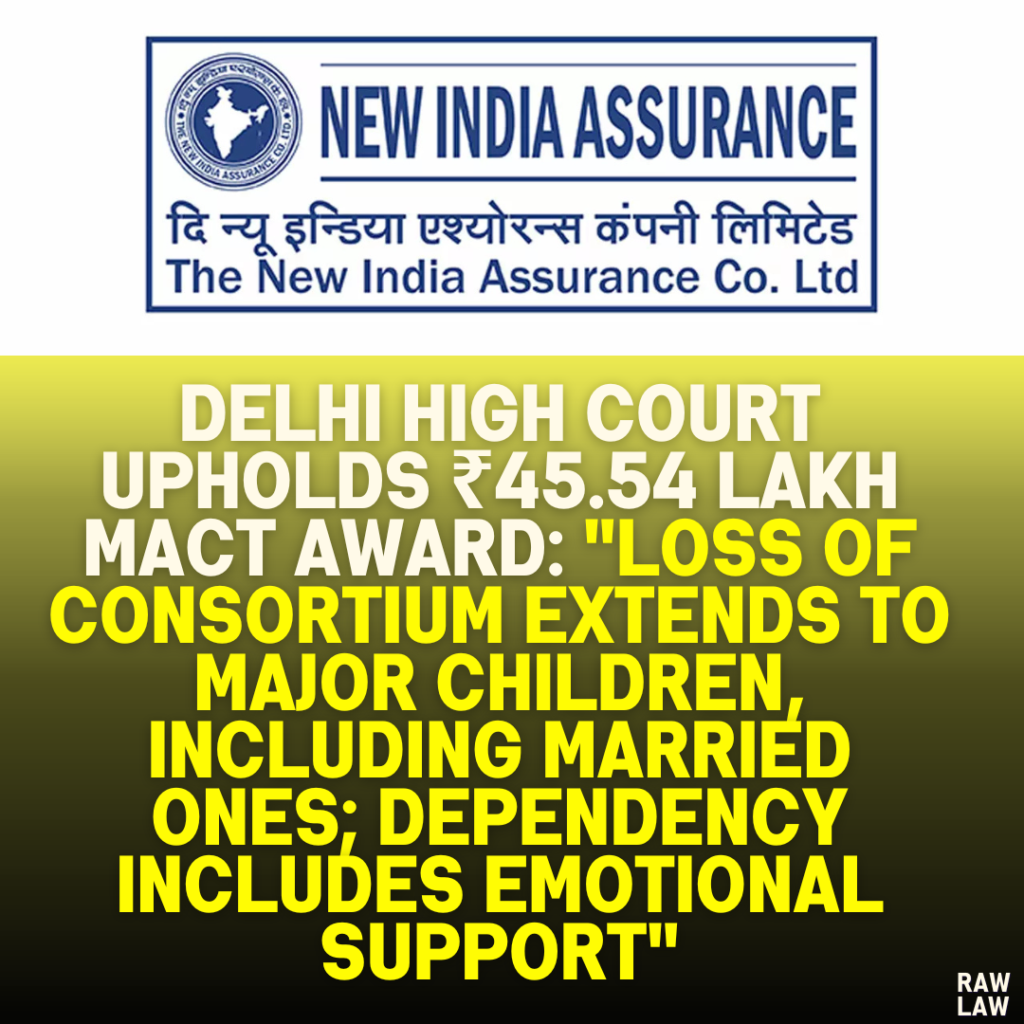Court’s Decision:
The Delhi High Court rejected the insurance company’s appeal against the Motor Accident Claims Tribunal’s (MACT) award of ₹45.54 lakhs to the family of the deceased. The court upheld the monthly income of ₹30,000 determined by the MACT and reaffirmed that loss of consortium can be granted to major and married children. It emphasized that dependency includes not only financial contributions but also emotional and caregiving support.
Facts:
The case arose from the death of a 52-year-old man in a road accident on April 7, 2017. He was the sole proprietor of a furniture shop, “M/s Om Furniture,” located in Kirari, Nangloi, New Delhi. The MACT awarded compensation based on a monthly income of ₹30,000, derived from the deceased’s bank statements. The compensation was distributed among his widow and four children, two of whom were married at the time of his demise.
The insurance company filed an appeal against this award, challenging both the income calculation and the inclusion of major and married children in the loss of consortium award.
Issues:
- Income Assessment: Was the MACT’s determination of the deceased’s monthly income as ₹30,000 valid despite the lack of direct proof?
- Loss of Consortium: Could major and married children claim loss of consortium under the Motor Vehicles Act?
Petitioner’s Arguments:
The insurance company argued:
- Income Speculation: The claimants failed to prove the deceased’s monthly income of ₹30,000 with reliable evidence. The MACT erred in its reliance on a single entry in the deceased’s bank statement.
- Invalid Consortium Award: Loss of consortium should not have been granted to major children, especially those who were married, as they were no longer financially dependent on the deceased.
Respondent’s Arguments:
The claimants countered:
- Income Evidence: The deceased’s bank account showed a cumulative credit of ₹3.57 lakhs over a year. This reasonably translated to an average income of ₹30,000 per month after deductions, as corroborated by the Detailed Accident Report (DAR).
- Consortium Validity: Dependency extends beyond financial contributions. The deceased’s emotional and caregiving roles justified the inclusion of all children, including those who were married.
Analysis of the Law:
The court applied the following legal principles:
- Just Compensation: Under the Motor Vehicles Act, the compensation awarded must adequately reflect the financial and emotional losses suffered by the claimants.
- Dependency and Consortium: Dependency is not restricted to monetary support; it includes emotional, caregiving, and familial roles. Loss of consortium is aimed at compensating the loss of companionship, care, and guidance.
Precedent Analysis:
The court referred to Branch Manager, ICICI Lombard General Ins. Co. Ltd. v. Kaliyamoorthy [(2018) 11 SCC 356], where it was held that married daughters, parents, and even siblings could be considered dependents under certain circumstances. It emphasized that dependency includes contributions to emotional and familial bonds, not just financial support.
Court’s Reasoning:
- Income Determination: The court found that the deceased’s income was properly assessed. The MACT relied on:
- Bank statements showing consistent credit of ₹3.57 lakhs in one year.
- The DAR’s confirmation of the deceased’s monthly income as ₹30,000.
- The insurance company’s failure to provide contrary evidence.
- Loss of Consortium:
- Dependency is a broad concept that goes beyond financial reliance.
- Even married or independent children can depend on a parent for emotional and familial support.
- The court highlighted that married daughters or sons could still rely on their parent’s care and guidance in times of need.
Conclusion:
The appeal was dismissed, and the compensation of ₹45.54 lakhs along with 6% annual interest was upheld. The court validated the MACT’s assessment of income and its decision to award loss of consortium to all children, regardless of their marital or financial independence.
Implications:
This judgment broadens the scope of dependency under the Motor Vehicles Act, emphasizing that loss of consortium is not limited to minors or unmarried children. It highlights the court’s progressive approach in recognizing emotional and caregiving support as vital aspects of dependency. This ruling may influence future cases by encouraging a more inclusive interpretation of familial dependency.



